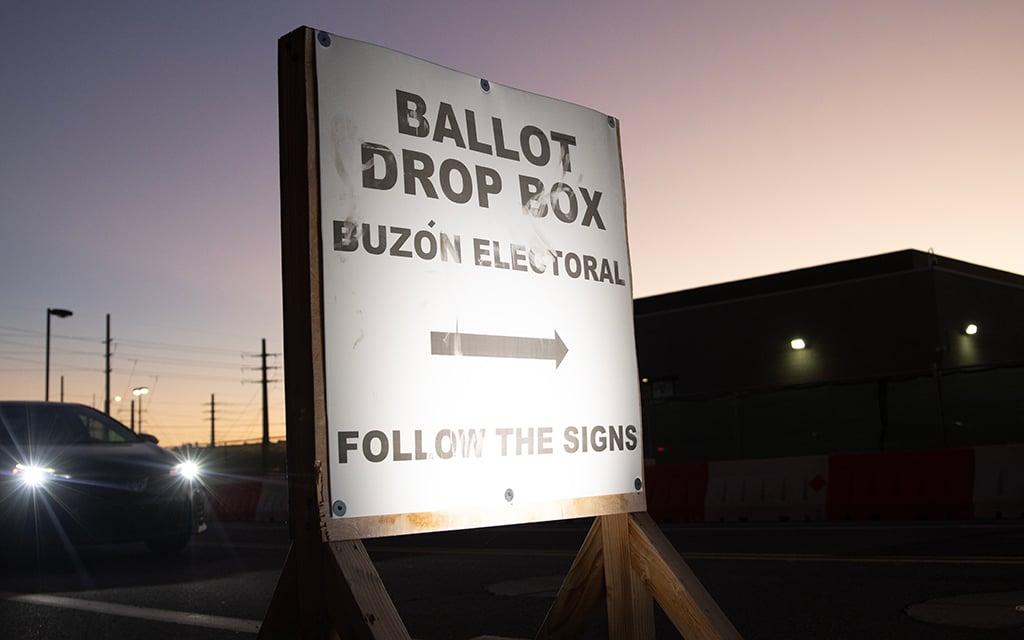WASHINGTON – A federal appeals court rejected an attempt by 2022 GOP candidates Kari Lake and Mark Finchem to stop Arizona’s use of electronic voting machines, saying the claims did not raise a “real and immediate” threat of voter fraud.
The ruling Monday by a three-judge panel of the 9th U.S. Circuit Court of Appeals upheld a 2022 U.S. District Court decision to dismiss the suit on the same grounds. It was the latest defeat for Lake, the failed Republican nominee for Arizona governor, and Finchem, the party’s failed nominee for secretary of state, who have mounted numerous legal challenges to their defeats.
Finchem said Tuesday that he is “not at liberty” to comment on the ruling. Lake, who recently announced a 2024 bid for U.S. Senate, did not immediately respond to a request for comment.
But the director of the Arizona Citizens Clean Elections Commission said the court was right to reject the claim.
“When you go into court, you have to have a plausible complaint to proceed on some factual basis,” said Tom Collins, the director.
“The courts are not ‘X, formerly known as Twitter,'” Collins said. “You can’t just pile unsupported inference after unsupported inference into a complaint and expect legal success.”
The suit was filed in April 2022 against then-Secretary of State Katie Hobbs and the supervisors of Maricopa and Pima counties in an attempt to block the use of electronic voting machines in that fall’s elections. They asked the district court to order that the 2022 elections be carried out with paper ballots that were hand-counted, among other restrictive measures.
In their suit, Lake and Finchem claimed that electronic tabulation systems are “susceptible to hacking by non-governmental actors who intend to influence election results.” They cited the Cyber Ninjas hand-counted election audit of Maricopa County’s 2020 general election, among other claims that electronic ballot tabulation can be manipulated.
But after laying out the plaintiff’s claims, both the district and circuit courts detailed the safeguards in Arizona’s election systems – including the fact that state law already requires paper ballots. The appeals court noted that the plaintiffs overlooked the Cyber Ninja’s conclusion that found “no substantial differences” between its audit and official election results.
The appeals court ruled that the claims by Lake and Finchem were “speculative allegations” insufficient to stand in court.
“Their operative complaint relies on a ‘long chain of hypothetical contingencies’ that have never occurred in Arizona and ‘must take place for any harm to occur,'” the court said.
The courts also rejected the claim that electronic vote tabulation violates the plaintiffs’ constitutional rights, noting that nothing in the system “has in any way burdened their individual exercise of the franchise.”
The court concluded the plaintiffs’ “candidacies failed at the polls, and their various attempts to overturn the election outcome in state court have to date been unavailing.” Their attempt to block the use of electronic voting machines in the future also fails, the court said, because they “failed to establish that a future injury was either imminent or substantially likely to occur.”
Collins said this case is an example of courts rejecting “speculation” into Arizona’s robust election integrity.
“The system we have in Arizona is reliable,” Collins said. “The opinion itself recognizes a number of checks and balances to ensure that those results…are balanced.”
Requests for comment from the Arizona secretary of state and the supervisors in Maricopa and Pima counties were either not responded to or were declined.


